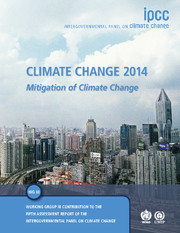 Climate Change 2014: Mitigation of Climate Change
Climate Change 2014: Mitigation of Climate Change Foreword
from Foreword, Preface, Dedication and In Memoriam
Published online by Cambridge University Press: 05 February 2015
Summary
Climate Change 2014: Mitigation of Climate Change is the third part of the Fifth Assessment Report (AR5) of the Intergovernmental Panel on Climate Change (IPCC)—Climate Change 2013/2014—and was prepared by its Working Group III. The volume provides a comprehensive and transparent assessment of relevant options for mitigating climate change through limiting or preventing greenhouse gas (GHG) emissions, as well as activities that reduce their concentrations in the atmosphere.
This report highlights that despite a growing number of mitigation policies, GHG emission growth has accelerated over the last decade. The evidence from hundreds of new mitigation scenarios suggests that stabilizing temperature increase within the 21st century requires a fundamental departure from business-as-usual. At the same time, it shows that a variety of emission pathways exists where the temperature increase can be limited to below 2°C relative to pre-industrial level. But this goal is associated with considerable technological, economic and institutional challenges. A delay in mitigation efforts or the limited availability of low carbon technologies further increases these challenges. Less ambitious mitigation goals such as 2.5°C or 3°C involve similar challenges, but on a slower timescale. Complementing these insights, the report provides a comprehensive assessment of the technical and behavioural mitigation options available in the energy, transport, buildings, industry and land-use sectors and evaluates policy options across governance levels from the local to the international scale.
The findings in this report have considerably enhanced our understanding of the range of mitigation pathways available and their underlying technological, economic and institutional requirements. The timing of this report is thus critical, as it can provide crucial information for the negotiators responsible for concluding a new agreement under the United Nations Framework Convention on Climate Change in 2015. The report therefore demands the urgent attention of both policymakers and the general public.
- Type
- Chapter
- Information
- Climate Change 2014: Mitigation of Climate ChangeWorking Group III Contribution to the IPCC Fifth Assessment Report, pp. vii - viiiPublisher: Cambridge University PressPrint publication year: 2015
- 3
- Cited by


